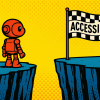
Late last year, I probed an LLM’s responses to HTML code generation prompts to assess its adherence to accessibility best practices. The results were unsurprisingly disappointing — roughly what I’d expect from a developer aware of accessibility but unsure how to implement it. The study highlighted key areas where training data needs improvement.
